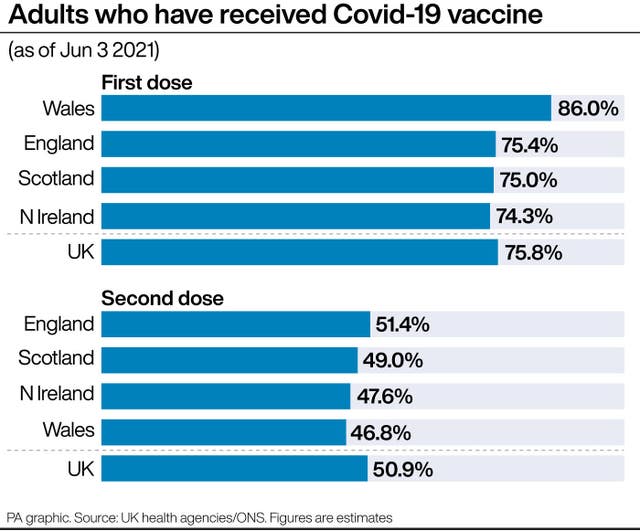‘Ethical dilemma’ in giving UK children jabs instead of donating doses overseas
The Pfizer/BioNTech coronavirus vaccine was approved for use in children aged 12 to 15 in the UK on Friday

There is an “ethical issue” about whether to vaccinate children in the UK against Covid-19 or donate jabs for vulnerable adults in lower- income countries, an expert advising the Government has said.
The Pfizer/BioNTech coronavirus vaccine was approved for use in children aged 12 to 15 in the UK on Friday.
The Medicines and Healthcare products Regulatory Agency (MHRA) authorised the use of the jab in the younger age group following a review of its safety, quality and effectiveness.
The Joint Committee on Vaccination and Immunisation (JCVI) will now provide advice to the Government on this age group being vaccinated as part of the jabs rollout.
While a “very small minority” of children have been severely affected by coronavirus, children “in the main” do not get severe illness, Professor Anthony Harnden, deputy chairman of the JCVI said.
He said much of the benefit of vaccinating children would be to prevent transmission to adults, therefore posing “ethical dilemmas as to whether you should” give children a jab mainly for the indirect benefit of adults.
Prof Harnden said we need to be “absolutely sure that the benefits to them (children) and potentially to society far outweigh any risks”.

He told BBC Breakfast: “I think the vast majority of benefit won’t be to children, it will be an indirect benefit to adults in terms of preventing transmission and protecting adults who haven’t been immunised, for whatever reason haven’t responded to the vaccine and therefore that presents quite a lot of ethical dilemmas as to whether you should vaccinate children to protect adults.”
He added: “There is the other wider ethical issue of whether you vaccinate children in this country or whether you donate that vaccine internationally to low and middle-income countries where they still have an at-risk adult population that haven’t been vaccinated.”
He said the JCVI will likely present a range of options to Government.
Health Secretary Matt Hancock has said the UK has “enough supply” to offer the vaccine to children aged 12 and over if recommended to do so by the JCVI.
He also signalled it would be his “first duty” to see children in the UK vaccinated rather than donate doses to developing countries.
He told reporters: “My first role, my first duty as Health Secretary for the UK is to make sure that the UK is protected and safe.
“And while thankfully, children are very rarely badly affected by Covid themselves, they can still pass on the disease – and so that is my first duty.”
Last month the director of the Oxford Vaccine Group said it is “morally wrong” to offer Covid-19 jabs to children in wealthy countries when high-risk groups in poorer nations remain unvaccinated.
Professor Andrew Pollard, who helped develop the Oxford/AstraZeneca Covid-19 jab, told the All Party Parliamentary Group on Coronavirus that children had a “near-to-zero” risk of severe disease or death from Covid-19 and that global vaccine inequity was “plain to see”.





